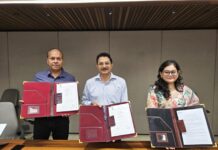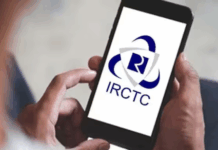Mumbai, October 18, 2016: The 1947 Partition Archive and Tata Institute of Social Sciences, Mumbai came together to host Voices of Partition, which took place on Friday, October 14th from 5:30 pm – 7:30 pm at the Library New Conference Hall. Survivors of the mass riots that unfolded during the violent end of British Raj in 1947 came together to tell their stories.
The event is part of the “Voices of Partition” event series, which brings eyewitness stories of Partition to live audiences across the globe. “Voices of Partition” focuses on the narratives recounted by witnesses and story collectors from both sides of the border. The stories take you back to a time of unique and fascinating cultural practices which are largely lost today.
Speaking on the panel at the Voices of Partition event in Mumbai were Partition survivors living there, namely, Shamlal Chawla and Dr. Vimla Malhotra, as well as Citizen Historian, Srishtee Sethi, who records witness stories on behalf of the 1947 Partition Archive. Moreover, crowdsourced footage of Archive interviews was also shown, followed by an open Q&A session. Following the event, the audience was given a chance to meet and speak with witnesses as well as The 1947 Partition Archive volunteers and team members.
The 1947 Partition of South Asia is recognized as the largest mass refugee crisis of the 20th century. Nearly 2 million died in the communal violence that accompanied Partition, and up to 25 million were uprooted through the 1950s, or 1% of the world’s population at the time.
“When we saw the mobs coming, we started running with only the clothes on our backs. My mother still was holding her tea in her hand,” Partition witness Anup Kohli remembers of the day in 1947 when she became homeless overnight in the wake of the communal violence that engulfed her home during Partition.
Citizen Historian Arshad Mirza says, “Even their loved ones may not have been privy to some of those traumatic details ofl their lives until now. I’ve learned to appreciate the fact that the Partition survivors are willing to share intimate experiences from a painful memory that had been tucked away for a long time. “
The year 1947 marked the end of the British rule in South Asia, as well as the birth of India and Pakistan. During the transfer of power, law and order broke down. Communal violence unfolded as India and Pakistan were divided along religious lines. An estimated 15 million people became homeless and over a million lost their lives. As many as 100,000 women were abducted and countless children were orphaned. Many of the eyewitnesses, now in their 70s and 80s, still remain deeply emotionally wounded. The global legacy of Partition lives on today in the form of the disputed Line of Control between India and Pakistan, the world’s second most heavily militarized border. The personal trauma that Partition brought colors religious and communal relationships today.
Yet, little has been done to capture and memorialize the victims’ voices. As Partition moves further back in time, first-hand stories are at risk of being lost forever. Many Partition witnesses have never before told their stories, and there is no record of their experience. The 1947 Partition Archive has set out to save these stories of Partition before it is too late, using a crowd sourcing method to record and preserve witness oral histories through “Citizen Historians”, volunteer interviewers from around the globe.
“Because we are huge believers in grassroots and crowdsourcing, we wanted to take that route. This way, anybody from anywhere can contribute,” says founder Dr. Guneeta Singh Bhalla.
If you or someone you know has a story to share, or would like to join Voices of Partition in the future as a panelist, please contact The Archive team at ask@1947partitionarchive.org






























